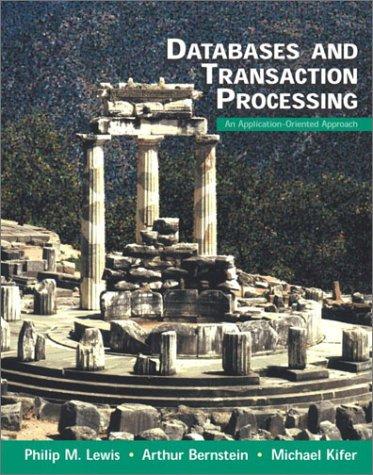Question
This is being done in python. What do I need to change? The errors That I get are Traceback (most recent call last): File C:/Users/OneDrive/Desktop/New
This is being done in python.
What do I need to change?
The errors That I get are Traceback (most recent call last): File "C:/Users/OneDrive/Desktop/New folder (4)/Project.py", line 10, in
My Coded
import string
# ask user for filename filename = input("Enter the filename: ")
# open input file for reading with open(filename, 'r') as input_file:
# read contents of file contents = input_file.read()
# count number of lines, words, and characters num_lines = contents.count(' ') + 1 num_words = len(contents.split()) num_chars = len(contents)
# output line, word, and character counts to console print(f"Number of lines: {num_lines}") print(f"Number of words: {num_words}") print(f"Number of characters: {num_chars}")
# create list of unique words and their frequency counts words = contents.translate(str.maketrans('', '', string.punctuation + string.digits)) words = words.lower().split() word_counts = {} for word in words: if word not in word_counts: word_counts[word] = 1 else: word_counts[word] += 1
# sort word counts alphabetically and output to output file output_filename = "Analysis-" + filename with open(output_filename, 'w') as output_file: output_file.write(f"Number of lines: {num_lines} ") output_file.write(f"Number of words: {num_words} ") output_file.write(f"Number of characters: {num_chars} ")
output_file.write("Unique words: ") for word, count in sorted(word_counts.items()): output_file.write(f"{word} ({count}) ")
output_file.write(" Repeating word pairs: ") repeating_pairs = {} words = contents.translate(str.maketrans('', '', string.punctuation + string.digits)).lower().split() for i in range(len(words)-1): pair = (words[i], words[i+1]) if pair not in repeating_pairs: repeating_pairs[pair] = 1 else: repeating_pairs[pair] += 1
for pair, count in repeating_pairs.items(): if count > 1: output_file.write(f"{' '.join(pair)} ({count}) ")
output_file.write(" Analysis Summary: ") output_file.write(f"Total number of words: {num_words} ") output_file.write(f"Average word length: {num_chars/num_words:.2f} ") output_file.write(f"Number of unique words: {len(word_counts)} ") unique_word_lengths = [len(word) for word in word_counts.keys()] output_file.write(f"Average length of unique words: {sum(unique_word_lengths)/len(unique_word_lengths):.2f} ") output_file.write(f"Number of repeating word pairs: {len(repeating_pairs)} ")
# output repeating word pairs to console print(" Repeating word pairs:") for pair, count in repeating_pairs.items(): if count > 1: print(f"{' '.join(pair)} ({count})")
# output analysis summary to console print(" Analysis Summary:") print(f"Total number of words: {num_words}") print(f"Average word length: {num_chars/num_words:.2f}") print(f"Number of unique words: {len(word_counts)}") unique_word_lengths = [len(word) for word in word_counts.keys()] print(f"Average length of unique words: {sum(unique_word_lengths)/len(unique_word_lengths):.2f}")
Step by Step Solution
There are 3 Steps involved in it
Step: 1

Get Instant Access to Expert-Tailored Solutions
See step-by-step solutions with expert insights and AI powered tools for academic success
Step: 2

Step: 3

Ace Your Homework with AI
Get the answers you need in no time with our AI-driven, step-by-step assistance
Get Started


